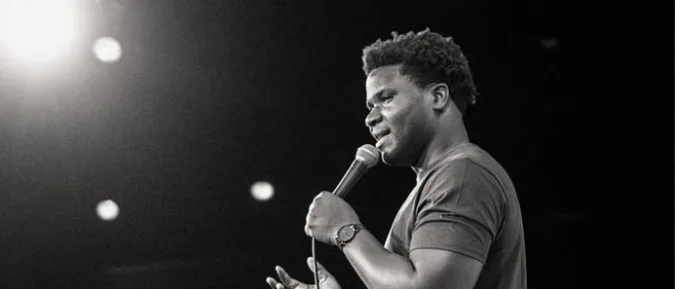“I love being in America where I can pursue such a dream. I’m not sad about it,” says actor Tanael Joachim
An immigrant chasing his dream, Tanael Joachim uses comedy to pay his rent and make people happy.
He presented his second stand-up show “Haitian Dreams” in Miami in August.
On the stage of the Fantasy Theater Factory at the Sandrell Rivers Theater that evening, there were plenty of seats. The budding comedian discussed topics such as why some people are considered “heroes,” Haitian-American belonging, and the realization of being a descendant of enslaved people and its connection to South America. On that last point, he jokes that the people of South America woke up to a bad case of “the Spaniard.”
“The series aims to be universal,” said the comedian in an interview with AyiboPost.
This special is also the origin of the popular clip you may have seen on social media, in which he jokes that the French language is only present in Haiti due to a training program. foreign exchange called “slavery”.
Although much laughter echoed around the room, there were only 30 spectators in the 172-seat theater.
Although Joachim strives to fill all the seats at his shows, he insists that his job is to give his best, regardless of the number of spectators, and says that he would not appreciate not a show if the audience wasn’t enjoying themselves.
As for the crowds, the comedian doesn’t blame the theater, adding that they did a great job.
A screenshot of Tanael Joachim’s first special titled JANUARY 3RD on Netflix.
According to a Fantasy Theater Factory spokesperson, an interview on NBC6 was coordinated, a press release was sent to the company’s database of 600 media contacts, and even though marketing n It is not obligatory for tenants such as Mr. Joachim, a certain promotion is made for each client.
There are posts for the show on the Sandrell Rivers Theater Instagram page, but not on Fantasy Theater Factory’s – the latter is a company that produces shows throughout Florida, primarily for families and children. The spokesperson confirmed that this is how things usually happen.
Before the Miami show, Joachim performed “Haitian Dreams” in Austin (Texas), Boston (Massachusetts) and Montreal (Canada). In September and October, he toured 13 countries in Europe, including a final in Istanbul, Turkey, before returning to New York.

Tanael Joachim on stage
For this rising star, traveling for comedy came many years after he immigrated to the United States in search of better educational opportunities, and it took a while before he even managed to scrounge up enough money to cover your rent thanks to this notoriously difficult profession. But, determined to make his dream come true, Joachim left university and set his sights on becoming an actor.
However, as an immigrant, Tanael’s journey began in Gonaïves, before arriving in America at the age of 19.
He understood that his education in Haiti would be of interest to Haitian-Americans because, in their case, they were born in the United States of Haitian ancestry and do not know what it is like to live in Haiti.
“They get the best of Haiti by living in the United States and are not exposed to the worst of Haiti,” he explains.
Around the age of 14 or 15, he says he didn’t go to school.
“I don’t remember a year where I went to school for the entire calendar year,” Tanael says.
But his parents want him to get an education.
He adds that they insisted on this point. For them, education is the only way to make something of your life. It is not necessarily a formal education, like a university degree, but understanding how life works, knowing how to read and write, knowing that access to information is easier thanks to libraries and the Internet, which promotes learning.
While he was still living in Gonaïves, his parents sent him to kindergarten at L’abc Joyeux, then to Collège Saint Paul, and to a Catholic school reserved for boys, the Cirguillot school. For college, he goes to Collège Immaculée Conception.
Later, in Port-au-Prince, he continued his secondary studies at the Institution Saint-Louis de Gonzague where he began to learn English.
In 2008, Joachim left Haiti for Adelphi University on Long Island to obtain a degree in business administration.
Read also: At 20 years old, Festival Quatre Chemins reveals its “magic formula” for longevity
Two years after the start of his studies, the 2010 earthquake triggered an existential crisis for him. The sight of such destruction in a matter of seconds leaves a deep mark on him and pushes him to focus on what he really wants in life.
“I realized that life was a little too fleeting,” says Joachim, who eventually withdrew from Adelphi and decided to move forward with acting.
Working in New York between 2008 and 2012, he strove to speak better English. Through television, books and conversations, he manages to improve himself and better understand things in the United States. However, it will still be many years before comedy can pay the rent.
Unemployment, race and class all played a role as the aspiring comedian worked to increase his income to avoid losing a roof over his head.
From helping troubled youth in a wilderness therapy program to working with a broker in a real estate office to roaming the streets of Manhattan as an assistant and bike courier (avoiding a few car accidents in the process), his path to success is paved with a wide range of experiences.
But, following the earthquake and largely before his acting career became increasingly reliable, Joachim worked primarily as a handyman, thanks to the skills he acquired in his youth in rubbing shoulders with masons and carpenters.
This time is filled with insecurities, from not having medical and dental coverage to not knowing if there will be work each day.
He works as a handyman by day and does comedy at night in clubs and concerts open to all, mostly for free, or nothing that allows him to earn a decent wage.
While he relies on a day job to cover his living expenses, the happiness the aspiring comedian gets from his start in comedy only grows.

He describes comedy as a liberating experience, where the comedian gets away with it. While jokes make strangers laugh, comedy “feeds your ego,” he explains.
For him, a dream does more than make someone happy, it doesn’t harm anyone and brings some value to the world. There may be people who seek to offend others in this area, but that is never a comedian’s end goal. For him, Tanael says, it’s not a good thing to offend people.
“It’s a pleasure to be funny,” he adds.
Among his sources of inspiration, Tanael Joachim cites George Carlin, whom he considers daring and one of his favorite comedians.
Joachim can be found among other Haitian comedians, including Garihanna, based in Montreal, Sejoe, in the New York and New Jersey area, Success Jr, in South Florida, Plus Pierre, based in Florida, and Ti Inosan , based in New Jersey.
Also read: What does an actor make a living in this country?
Historically, American stand-up comedy is linked to minstrel shows where white people ridicule black people by perpetuating stereotypes of African Americans—using burnt cork to paint their faces, exaggerating their character’s eyes and lips, which is known as “blackface.”
The caricature of a black man, Jim Crow, became a common character in minstrel shows.
Many stereotypes against black people originated from minstrel shows. Despite the repeated appearance of blackface, minstrel shows declined as vaudeville shows increased and retained their popularity between the 1890s and the 1930s.
Comedy performances also took place at burlesque shows, saloons, and music halls.
With the broadening talent base and tools of comedy, aspiring comedians have had more things to consider in their work.
After vaudeville, in the absence of an established set of standards, they devoted more time to performance, emphasizing delivery and timing, to the extent that the lines were easy to steal.
Later, in the 1960s, standards such as recognition of talent and experience contributed to performance, and comedians like Chris Rock became more involved in writing.
Key elements such as timing, writing, delivery and voice play a central role in Joachim’s work today, notably in his joke about the overseas exchange program.
But, according to Joachim, a joke cannot be explained, otherwise magic no longer exists.
No subject is off-limits in comedy. Even being Haitian can be ridiculed, he adds. Well, provided you are able to do it well.
“I don’t think there is a limit, that’s the point of comedy, you can make fun of everything that happens in life,” says Joachim, adding that it’s the audience who decides if it is funny or not.

Tanael Joachim on stage
Stand-up is the most direct form of communication, he claims, more so than singing, rapping, musical instruments and speaking. The audience either laughs or doesn’t laugh when they hear the joke.
“Haitian Dreams” is Joachim’s second special album recorded in front of an audience. The first, published in 2020 and called “January 3”, is available on Amazon Prime and is named after the comedian’s birthday.
In this special, he explores topics such as English as a third language, race and the Me Too movement.
The Me Too movement was started by Tarana Burke to demand that victims of rape or assault be believed and that the perpetrators of these crimes be held accountable. Most victims are victims of their intimate partners or family members. Perpetrators are often protected by rape culture, in which individuals, families, and communities diminish the severity of violence and abuse against women to protect the men who commit these acts.
In his gaze, Joachim explains that the “Me Too” movement has highlighted the depravity of protecting men from the consequences of their crimes, and even the perversion that manifests itself in different levels, from outright assaults to making women feel uncomfortable in public spaces.
Joachim adds that a mirror is held up to men so that they do what he calls “creep-management”.
“Men need to be a lot less scary, so that when they go out into the world, they don’t view women as objects,” says Tanael.
On stage in Miami, Malala Yousafzai is a hero and Greta Thunberg is not, and having someone misnamed isn’t as traumatic as seeing a corpse burned to the bone, Tanael says.
However, he refused to answer questions regarding the humor behind his jokes.
Before declining, he added that the more serious a subject is, the more one must try to find humor in it to defuse its power and make it manageable.
Also read: Exchanges in Paris with Haitian comedian Christolin Rodlin
In “January 3rd” he also explores the issue of race in relation to Haiti, noting that the country may be considered very pro-black, but that Haitian identity is not black. In Haiti, Haitians rarely, if ever, consider themselves black.
It was following his move that Tanael realized how race is connected to so many things in the United States.
“There are some venues in Brooklyn where there are only black people, like Moe’s and Essence, other venues are mainly occupied by whites, like those in Williamsburg, the Upper East Side or the Upper West Side,” he explains.
The difficulty of life as an immigrant also comes to mind, including the debt he feels to Haiti, which helped him become the global citizen he sees today. hui in the mirror.
As an outsider, the comedian has a front-row seat to witness the final stages of gentrification.
His observations on Brooklyn’s transformation are limited, as his life in New York began after the gentrification of the 1980s and 1990s, but what happened is still relevant today and affects this transplant’s life.
For Tanael, part of the racial discussion is about white-liberal pity, when white liberals think it’s up to them, in particular, to save black people.
“He tries to be compassionate, but he’s really condescending,” he says.
The aspiring comic’s struggle through the US immigration system included obtaining a student visa, a work visa and becoming a green card holder, although technically it is a ” permanent resident of the United States of America.

In the United States, after leaving Haiti where his brother stayed from his teens until his late 20s, Joachim says he was trying to find a way to save Haiti.
“I felt guilty,” says Tanael. “We can’t save people. Haiti did not become what it is because of me.”
Although Haitian comedians such as Jean Claude Joseph, Papa Pierre and Tonton Bicha perform in Haiti, Tanael believes that it was emigrating to the United States that opened the doors to comedy for him.
In 2008, Haiti’s economic situation was better than in 2023, but President René Préval declared that Haitians would have to swim to leave the country – showing how much Préval understood that the Haitian government would be helpful. Haiti’s problems would have been more pressing in life, Tanael says, and the comedy could only have been done on a small scale and without the possibility of making money.
He even jokes about being an immigrant in comedy, since this dream came to him later in life, when he did not aspire to become a comedian as a child.
While not regretting leaving Haiti to pursue a dream, Tanael says that if he had decided to stay in Haiti, he might have been able to work with the parents who raised him, and medical school might have been considered.
“If I was still in Haiti, I’m pretty sure I wouldn’t be doing comedy. I’m not sad about it. I feel very lucky to be able to do comedy,” he says. “It’s the thing I really love in life, it’s the job I love. I love being in America where I can pursue such a dream.”
Cover Image: A screenshot from Tanael Joachim’s first special titled JANUARY 3RD on Netflix. Screenshot 2023-08-13 20.36.43
Keep in touch with AyiboPost via:
► Our channel Telegram : Click here
► Our Channel WhatsApp : Click here
► Our Community WhatsApp : Click here







